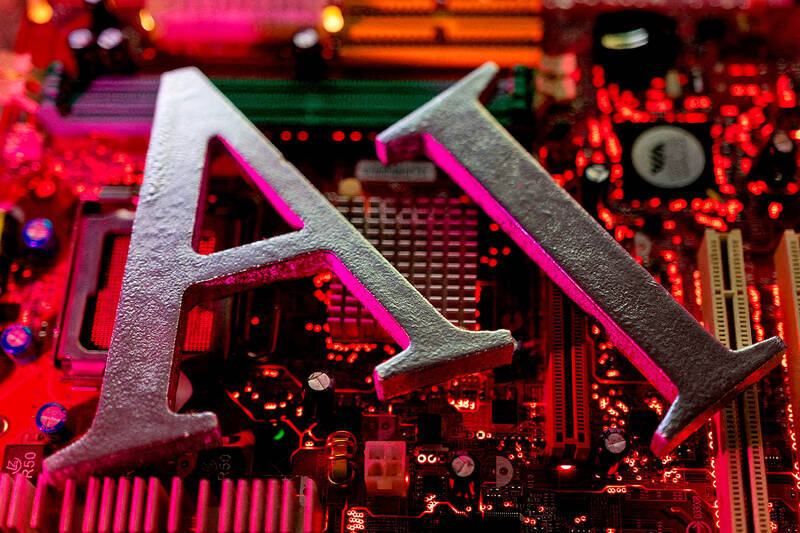Information security experts yesterday expressed concern over the risk of personal data being leaked to China, after an app from a Chinese company that uses generative artificial intelligence (AI) went viral on social media in Taiwan.
After a user provides access to their social media accounts on services such as Instagram, X or LinkedIn, the AI-powered app Roast Master analyzes the user and generates sardonic comments about their MBTI personality type — referring to the personality assessment tool Myers-Briggs Type Indicator popular among younger people — weaknesses and strengths, and fortune predictions for the year.
Roast Master is offered as one of the services provided by the AI assistant Monica, but it was developed by a Chinese company of the same name, whose Chinese parent company is Butterfly Effect Pte.

Photo: Reuters
As a highlighted feature of Monica, Roast Master is touted as “the ultimate AI roast generator for Instagram, Facebook, Twitter [X]” and other social media despite Instagram and X being banned in China, indicating that the company is aimed at overseas markets.
Monica’s intention to enter the Taiwan market is also reflected in its numerous advertisements in Taiwan and the app’s language options, which include Traditional Chinese for Taiwan and Hong Kong.
While using the Web site as a stand-alone service would be less risky, as it reveals less information to the service provider, downloading and registering on the company’s app would allow it to track user behavior, preferences and even access private information, National Taiwan University of Science and Technology Taiwan Information Security Center director said Cha Shi-cho (查士朝) said.
The Chinese-developed AI assistant could also provide users with misleading information to manipulate their thinking, he said, adding that “it is fine to have fun, but the generated results should not be taken seriously.”
Democratic Progressive Party Legislator Puma Shen (沈伯洋) said that it is known that these apps could access personal data of their users such as contacts, location and social media accounts.
There are security risks when it comes to using services provided by Chinese companies or those with Chinese investments, as Chinese law enables the authorities to access their personal data, he said.
Deputy Minister of Digital Affairs Lin Yi-jing (林宜敬) said the ministry would step up efforts to raise the public’s awareness about the importance of information security.
Taiwan is a democracy with strong freedoms so the government should not impose strict regulations like authoritarian countries, he said.
Although AI-powered services present challenges to information security and freedom of speech, the government would only ban a product if it is proven to be a clear security concern, such as by recording voices or activating cameras without user consent, Lin said.
Cha said people should choose trustworthy companies when using online services and beware of security risks such as data leaks with unidentified service providers.
Some apps ask users to grant permissions that are not necessary for their functions, including access to microphones and cameras, so users should be aware they should not upload too much information which could reveal their identity, he added.

Three Taiwanese airlines have prohibited passengers from packing Bluetooth earbuds and their charger cases in checked luggage. EVA Air and Uni Air said that Bluetooth earbuds and charger cases are categorized as portable electronic devices, which should be switched off if they are placed in checked luggage based on international aviation safety regulations. They must not be in standby or sleep mode. However, as charging would continue when earbuds are placed in the charger cases, which would contravene international aviation regulations, their cases must be carried as hand luggage, they said. Tigerair Taiwan said that earbud charger cases are equipped

Foreign travelers entering Taiwan on a short layover via Taiwan Taoyuan International Airport are receiving NT$600 gift vouchers from yesterday, the Tourism Administration said, adding that it hopes the incentive would boost tourism consumption at the airport. The program, which allows travelers holding non-Taiwan passports who enter the country during a layover of up to 24 hours to claim a voucher, aims to promote attractions at the airport, the agency said in a statement on Friday. To participate, travelers must sign up on the campaign Web site, the agency said. They can then present their passport and boarding pass for their connecting international

Temperatures in northern Taiwan are forecast to reach as high as 30°C today, as an ongoing northeasterly seasonal wind system weakens, the Central Weather Administration (CWA) said. CWA forecaster Tseng Chao-cheng (曾昭誠) said yesterday that with the seasonal wind system weakening, warmer easterly winds would boost the temperature today. Daytime temperatures in northern Taiwan and Yilan County are expected to range from 28°C to 30°C today, up about 3°C from yesterday, Tseng said. According to the CWA, temperature highs in central and southern Taiwan could stay stable. However, the weather is expected to turn cooler starting tonight as the northeasterly wind system strengthens again

Taiwan sweltered through its hottest October on record, the Central Weather Administration (CWA) said yesterday, the latest in a string of global temperature records. The main island endured its highest average temperature since 1950, CWA forecaster Liu Pei-teng said. Temperatures the world over have soared in recent years as human-induced climate change contributes to ever more erratic weather patterns. Taiwan’s average temperature was 27.381°C as of Thursday, Liu said. Liu said the average could slip 0.1°C by the end of yesterday, but it would still be higher than the previous record of 27.009°C in 2016. "The temperature only started lowering around Oct. 18 or 19